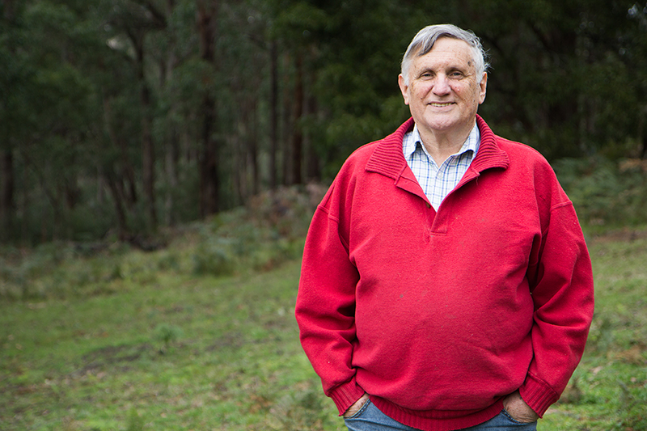We get to know prolific writer and teacher, John Marsden
He’s the writer you dreamed of becoming, the tree-climbing school teacher you wished for and the über cool stepdad from the movies. John Marsden is one of Australia’s national treasures and foremost “teen activists”, a grassroots campaigner for the rights of education, imagination and creative expression.
For most of us, Marsden is best known as the author of the books we tucked up in bed with as kids, his provocative and often dark novels gathering a cult following here and overseas. He has sold more than 5 million copies around the world, including in Sweden, where in 2000 the government paid to have one of his books distributed to every child of appropriate age in the country.
They didn’t need to get formal about it in Australia: even the most reluctant reader inevitably found themselves glued to the pages of the Tomorrow series in the early ‘90s, propping their eyes open to find out what happens to the group of kids trying to survive in a dangerous new world.
“I pick up other people’s rubbish wherever I go — in the bush, at school, along the street, at the kids’ soccer matches. And I hate to see wild animals killed, or wild places desecrated.”
Still, getting words out of him now is not as easy as I expected. Not for lack of stories but for the time to share them. In what is almost the ultimate sacrifice for a prolific writer, in recent years Marsden has put down his pen in lieu of full-time teaching at Candlebark, one of two independent schools he founded on bush properties outside Melbourne.
While Marsden once admitted that he dreamt of fame and fortune before his writing career took off, the time constraints placed on our interview make it clear how priorities have shifted. “Before becoming a principal I wrote about three books every two years,” he shares. “Since then, it’s been three books in 11 years. My days are filled with school management issues. I work on school stuff 10–12 hours a day, 6–7 days a week.”
It’s the same kind of dedication that allowed Marsden to write or edit 40 books in almost as many years.
Lessons of youth
John Marsden’s family tree shows no trace of writers, although his great great great great uncle was a famous Australian clergyman who wrote millions of words in the form of sermons, letters and diaries.
The Rev Samuel Marsden was a tough cookie. Known as the “Hanging Parson”, it was said that he sentenced people to death by hanging on Friday, gave them Communion at church on Sunday, then supervised their execution on Monday. One of Samuel’s biographers commented that, in all the millions of words he wrote, no hint of a sense of humour could be discerned — except for one pun that was probably accidental.
His nephew down the line has righted the wrongs, speaking out against corporal punishment in schools, and sporting a distinctly dry Aussie wit that does not suffer fools gladly.
John’s own father was somewhat more conservative: a bank executive who fought with distinction in World War II. His mother was a strong person who believed in the value of education and who did everything possible to give her children successful starts in their careers. Possibly the best thing she did was foster a love affair with books. Among Marsden’s early influences were Robinson Crusoe, the works of Tasmanian author Nan Chauncy, and his favourite: The Children of Cherry Tree Farm by Enid Blyton.
“I wanted people to have experiences that would mean something to them rather than for me to stand up the front of the class and tell them about life.”
Some have likened Marsden to Tammylan, the main character in Blyton’s fiction, who lived rough and had a great affinity with nature. “Certainly, like Tammylan, I pick up other people’s rubbish wherever I go — in the bush, at school, along the street, at the kids’ soccer matches,” he says. “And I hate to see wild animals killed, or wild places desecrated.”
Marsden grew up in the bush and, he says, time spent there is still one of the things he relies on to nourish his soul. When he was 10 years old, though, the family moved from country Victoria to Sydney, where all four children attended conservative “paramilitary” private schools, which helped shape his views on schooling. According to Marsden, he spent hours pondering profound educational questions such as, “Why does school have to be so crap?”
The young man poured himself into reading, especially on detention, absorbing the relatively sophisticated — Salinger, Dickens, Kafka — and the adolescent thrillers — Fleming, Innes, Bagley. “I learnt from the masters,” he recalls. “Plot, tension, timing and pacing, stunning surprises and ingenious solutions.”
At Sydney University while attempting an Arts/Law degree, Marsden struggled. A growing sense of alienation and loneliness, deriving from family rifts, educational experiences and his own personality resulted in his dropping out and eventually being admitted to a psychiatric hospital. Here, he was able to explore the primacy of his emotions, which enabled him to begin “building a new life”.
The new life took many twists and turns, turning over dozens of jobs in his 20s before deciding to try his hand at teaching in 1978. In the classroom, he was pleased to find ample opportunity for creative expression and experimentation.
“I wanted people to have experiences that would mean something to them rather than for me to stand up the front of the class and tell them about life,” he says. Experiences such as taking his English class to an abattoir. Studying a book that involved large animals being killed, Marsden noticed a kind of apathy infecting the classroom. To rouse a feeling response, he promptly bussed them all to the killing room of an abattoir to see firsthand the reality of their reading material.
Recounting the experience on ABC’s Denton, Marsden said, “Out of 28 kids, three finished the tour; the rest of them were outside with their heads between their knees. Three of them became vegetarians on the spot. I didn’t know for a long time if I’d done the right thing or not. But now, when I meet those students, that’s the lesson they remember.”
Writing adventures
During his time as Head of English at Geelong Grammar’s Timbertop campus, Marsden began entertaining thoughts of writing something for adolescents that they might actually like. This decision coincided with a different approach to his writing. Abandoning the unproductive edit-as-you-go method, Marsden experimented with full-throttle storytelling. The result was the highly successful 1987 release So Much To Tell You, written in three weeks.
Marsden’s writing career took off as he continued teaching. To date, he has written or edited 40 books, including Letters from the Inside, Everything I Know About Writing, Secret Men’s Business, The Rabbits and the phenomenally successful Tomorrow Series and Ellie Chronicles.
The desire to write Tomorrow, When the War Began in 1992, Marsden says, was partly born from a conscious desire to revive adventure stories for young people. “Increasing urbanisation had seen the gradual disappearance of ripping yarns and bush tales. I wanted to marry them with the new teenage genres, where feelings, relationships and character development were all-important.”
The 10 books that ensued, which detail the lives of Ellie Linton and her friends as they struggle to survive in a post-invasion world, have been huge hits, both locally and internationally.
“Lively” learning
In 1998, Marsden bought a vast bush property north of Melbourne, where for eight years he ran popular writing camps, attracting school groups from as far away as Indonesia, Singapore and Turkey. The success of this venture encouraged him to go further and, at the start of 2006, he launched his own school.
Described by some as a cross between Steiner and The Simpsons, Candlebark is based on a philosophy of creative “lively” learning, the prospectus on the website listing the wide spectrum of learning modalities this could encompass: log splitters and chainsaws; microwaves and blenders; lighting fires; playing “rambunctious roughhousing games” like British Bulldog; “up ladders, on roofs, changing light globes, using hammers, saws, mattocks, vacuum cleaners and electrical tools”.
“We should have brilliant, knowledgeable adults working with small groups of kids — and we should provide heaps of room for the children to run, play and explore.”
“The main basis of Candlebark is that we track down fascinating teachers with a rich variety of life experiences, minimise the number of bureaucratic constraints on their teaching, encourage them to take kids out into the world as frequently as possible and emphasise to students the importance of being adventurous, curious and trusting,” says Marsden.
The school quickly filled to capacity and, in 2016, Marsden opened Alice Miller, an arts-focused secondary school, also in the Macedon Ranges. Marsden sees both schools as providing a viable alternative to the “inherently unworkable” model of mainstream education.
“[The current system] is like a building made of cardboard, sheets of rusty iron and bits of plastic sheeting, all held together by duct tape. The miracle is that hard-working teachers have managed to keep it going for so long.
“The basic idea, that you take the biggest possible number of kids, squash them into the smallest possible space and provide the fewest possible number of adults to look after them is not viable. We should have brilliant, knowledgeable adults working with small groups of kids — and we should provide heaps of room for the children to run, play and explore.”
When I visited Alice Miller last year to teach a bushcraft program, this is exactly what I discovered. Walking in to what I thought was the staff room, I found kids making toasties and hot chocolates and sitting around the table chatting with peers and teachers before class started. I was surprised how shocked I was that they were relating to me as just another person making tea.
Walking his talk
After many years as a single man expressing his views on raising teenagers through his books and his teaching, Marsden faced his own test as a stepdad of six boys some years ago, after he met his wife Kris through “a parent-teacher interview that went horribly wrong”. Being a father has confirmed his views on good parenting.
“I’ve always thought that if you treated your children and teenagers reasonably well most of the time, tried to be sensible and good-humoured, didn’t patronise them too much and did not have control issues where you obsessively tried to manage every detail of their lives, they’d probably come out in good shape. I don’t want to sound smug, but with six kids we seem so far to be scoring 6 out of 6.”
The experience has also confirmed for him the need to bring back age-appropriate rites-of-passage. At Candlebark, students are encouraged to test their mettle on demanding physical expeditions such as walking from Victoria over Mount Kosciuszko or canoeing down the Snowy River.
“Rites-of-passage ceremonies are important. Unfortunately there are almost no meaningful ones left in our society. This poses a dilemma: do we invent new ones or do we not worry about them? If we invent new ones, they will suffer from being artificial. Rites-of-passage ceremonies should arise organically out of the practices and beliefs of the society. But, on balance, I think we are probably better to have ones that we create artificially than to have none at all.”
The kind of tending to the world at large that Marsden models is a quality of true elderhood, an assumption confirmed when he speaks directly to the spiritual.
“Empathy, compassion and mutual understanding — it’s hard to think of anything that could be more important. At the moment we seem to be seeing a pandemic of narcissism and its inevitable concomitants: selfishness and greed. I shudder to think of the difficulties many of today’s kids will have when they become adults and try to live in a relationship with another adult.”
When asked how he maintains hope while remaining aware of the dangers of climate change and ecological crisis, Marsden is characteristically both philosophical and practical.
“When I was a kid, I read a quotable quote in, of all things, Readers Digest, which said: ‘Loving the world is easy; it’s loving the guy next door that’s difficult.’ I think this applies to many situations. We can all talk glibly and beautifully about the need for global action, but do we stoop to pick up the plastic bag in the gutter that otherwise may end up in the ocean? I think we should campaign globally but at the same time make sure we do all we can on a micro level.”
Thinking globally but acting locally is exactly what Marsden has achieved, although the ripples of his actions have extended far beyond the pond in which they began.








